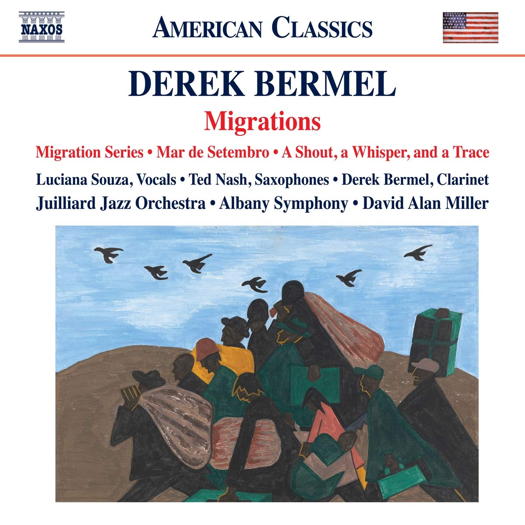 VIDEO PODCAST: Slava Ukraini! - recorded on the day Europe woke up to the news that Vladimir Putin's Russian forces had invaded Ukraine. Also features Caitríona O'Leary and Eric Fraad discussing their new film Island of Saints, and pays tribute to Joseph Horovitz, Malcolm Troup and Maria Nockin.
VIDEO PODCAST: Slava Ukraini! - recorded on the day Europe woke up to the news that Vladimir Putin's Russian forces had invaded Ukraine. Also features Caitríona O'Leary and Eric Fraad discussing their new film Island of Saints, and pays tribute to Joseph Horovitz, Malcolm Troup and Maria Nockin.
- Artalinna
- comment
- Emily Howard
- Alberto Ginastera
- Dan Iordăchescu
- Haydn: The Creation
- Graham Lustig
- Oswald Spengler
ARTICLES BEING VIEWED NOW:
- Régine Crespin
- Hector Berlioz
- Ruth Railton
- Marina Koshetz
- Marián Varga

The Merging of Migrating Sounds
ONA JARMALAVIČIŪTĖ listens to music by
American composer Derek Bermel
'... here the merge is extremely harmonious.'
The topic of migration is relevant to the present day, making it a discourse between artists and the current generation's creative minds. It comes as no surprise that the composer, known for his unique approach to music-making - Derek Bermel - presents a new CD of music expressing the theme of moving, change of environment and unseen cultural landscapes.
The ever-changing flow and eclectic style of his sound distinguish composer, conductor, and clarinetist Derek Bermel (born 1967) from today's other creative minds. His fresh and creative approach could be impacted by a variegated lifestyle formed by ethnomusicology studies and travels fueled by a constant search for different musical inspirations. Therefore a global approach becomes an artistic imperative in his musical language. Bermel's work could be described as a 'fusion', covering an amazing amount of ground and blending together various facets of academic as well as world music, American folk, funk, jazz and blues.
His latest recording, Migrations, is brought to life by joint forces of the strongest in the musical world. New York's Albany Symphony Orchestra in the grip of Grammy Award-winning conductor David Alan Miller (born 1961) is enriched by the fresh timbres of the Juilliard Jazz Orchestra. Being the music director since 1992, Miller has proven himself a compelling orchestra builder, exploring unusual repertoire and creating new initiatives in educational programming, community outreach and recording. Juilliard Jazz Orchestra is known as performing a wide spectrum of American jazz music, including works by contemporary composers. The result of such a merging of styles is a sound that is endlessly inventive, captivating and colorful, painting a picture of the intertwined movement of sounds and the cultural shift of migrating souls.
The first piece on the recording is called Migration Series for Jazz Ensemble and Orchestra (2006). The composer was influenced by Jacob Lawrence's original Migration Series (1941): sixty paintings depicting the Great Migration of African-Americans from the rural South to the urban North during the early decades of the twentieth century. Through a confluence of technique and form, Lawrence responded to a major historical event involving the viewer in the bigger world of ideas and concepts of humanity. As a teenager, Derek Bermel visited the exhibition when his mother took him to the Museum of Modern Art. These works had made such a singular impression on the composer that he would keep returning to the work over subsequent decades. But the idea to compose music with reference to these paintings came to his mind way later. Around the year 2004, the composer was introduced to trumpeter Wynton Marsalis (born 1961), who requested a piece for the Lincoln Center Jazz Orchestra.
Lawrence's cycle of paintings comes to grips with the roots of the African American culture. So does Bermel's composition. While describing the compositional process, Bermel explains that he relied on different elements - such as color, shape or texture - reflecting each other between the different paintings. In this way, he could engage in a larger musical view through lots of smaller sound stories. Writing jazz for a classical ensemble is always complex and not everyone masters this combination of jazz and academic performers organically, but here the merge is extremely harmonious. The vivid orchestration and rhythmical patterns make the pictures come alive within a larger musical narrative. As it reflects the migration of African-Americans, the composition is growing out of the jazzy melodies and harmonies, standard jazz and blues sounds, having their roots in traditional spirituals as well as other elements that are foundations of the jazz/blues world. The spirit of The Juilliard Jazz Orchestra is felt very prominently here.
Listen — Derek Bermel: After a Lynching (Migrations Series)
(track 2, 1:56-2:54) © 2019 Naxos Rights (Europe) Ltd :
The second piece, Mar de Setembro (September Sea) (2011) began as a commission from the Los Angeles Chamber Orchestra, giving Bermel the opportunity during his ethnographical music studies. The composer has made several trips to Brazil, where he learned Portuguese and studied percussion. The creative process had begun with the discovery of texts by the great Portuguese poet Eugénio de Andrade (1923-2005), depicting the poet's journeys across the ocean and the soul. The composer wrote five songs based on these texts: Prólogo: Que Voz lunar; Mar de Setembro; Canção; Ocultas Águas; and Frutos. This work vividly evokes and exploration Latin American Saudade, Portuguese for longing - the feeling of the blues. This is mostly felt in the bossa nova rhythms, combined with non-classical popular elements. Bermel's score is at once sumptuous and unpredictable, as Brazilian as Modern, yet more lyrical than strident. The solo vocalist here is leading jazz singer and interpreter Luciana Souza. Her work includes jazz, contemporary and world music. The composition Mar de Setembro was inspired by the singer and dedicated to her, since the composer admires her bell-toned voice. Souza sings with clarity of expression and tone; with both vocal and emotional strength.
Listen — Derek Bermel: Mar de Setembro (Mar de Setembro)
(track 7, 0:00-0:59) © 2019 Naxos Rights (Europe) Ltd :
The final work, the three movement orchestral composition A Shout, a Whisper, and a Trace (2009), is a tribute to Hungarian composer Béla Bartók (1881-1945). During emigration after the outbreak of World War II, Bartók spent his last years in New York. Bermel was inspired by a copy of Bartók's letters that he wrote home from New York. Bartók's last years were creatively rich but otherwise poor - he was financially strapped and in rapidly declining health. His letters were full of longing, much in the way that Lawrence describes the South in his paintings. Migration is very much a theme here, forcing the listeners to consider their hometown with fresh eyes. This piece works as a response to the experience of immigrants, making sense of New York City. Evoked high-spirits swap with solitude and heartfelt reminiscences. Musically this refers to the atmospheres of Bartók's last work - Concerto for Orchestra, as well as to jazz colors and Balkan rhythms. Bermel decided to use different musical elements that would represent a clash of cultures. The harmonies are representative of New York culture, while the rhythms are a little more from Eastern Europe traditions, mingling with the other residents, past and present. A Shout, A Whisper, and a Trace brings listeners to a fully modern orchestral zone of vibrant sound color, with an infectious and rhythmical dance. This is a sensitively conceived and intelligently written tribute, with a well-balanced and convincing performance by the Albany Symphony and David Alan Miller. Such are the interpretations of the other Bermel works on this recording.
Listen — Derek Bermel: vég (A Shout, A Whisper, and a Trace)
(track 13, 4:00-5:00) © 2019 Naxos Rights (Europe) Ltd :
The sound of this CD balances familiarity and newness, with a modern jazz twist ringing in certain style clusters. The roller-coaster-like musically expressed emotions run deep and reach high. The composer juggles combinations of instruments, gestures, new and old rhythms, harmonies and vocal melodies. In this way, Bermel brings rich strands of music history together with his own artistic direction. This merging point reaches everyone listening to Migrations.
Copyright © 23 December 2019
Ona Jarmalavičiūtė,
Vilnius, Lithuania

CD INFORMATION - DEREK BERMEL: MIGRATIONS


